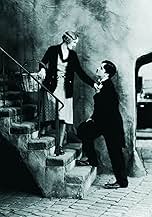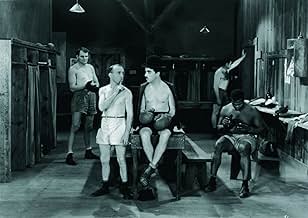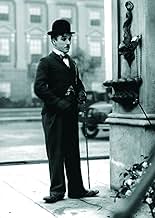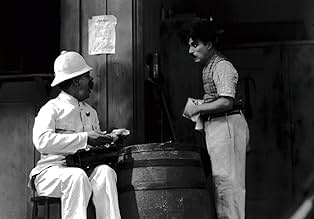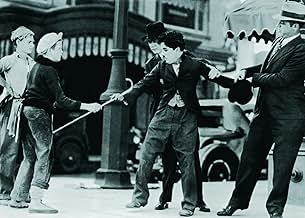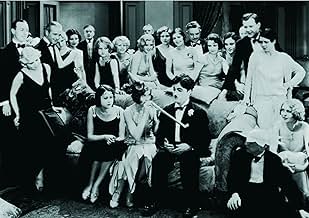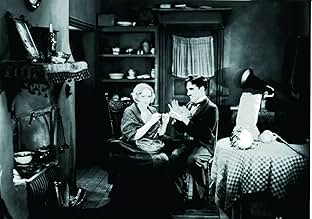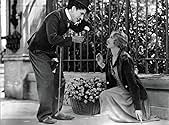PUNTUACIÓN EN IMDb
8,5/10
203 mil
TU PUNTUACIÓN
Con la ayuda de un hombre adinerado, borracho e imprevisible, un ingenuo vagabundo que se ha enamorado de una florista ciega intenta conseguir dinero para poder proporcionarle ayuda médica.Con la ayuda de un hombre adinerado, borracho e imprevisible, un ingenuo vagabundo que se ha enamorado de una florista ciega intenta conseguir dinero para poder proporcionarle ayuda médica.Con la ayuda de un hombre adinerado, borracho e imprevisible, un ingenuo vagabundo que se ha enamorado de una florista ciega intenta conseguir dinero para poder proporcionarle ayuda médica.
- Premios
- 4 premios en total
Charles Chaplin
- A Tramp
- (as Charlie Chaplin)
Al Ernest Garcia
- The Millionaire's Butler
- (as Allan Garcia)
Johnny Aber
- Newsboy
- (sin acreditar)
Jack Alexander
- Boxing Match Spectator
- (sin acreditar)
T.S. Alexander
- Doctor
- (sin acreditar)
Victor Alexander
- Superstitious Boxer
- (sin acreditar)
Albert Austin
- Street Sweeper
- (sin acreditar)
- …
Harry Ayers
- Cop
- (sin acreditar)
Eddie Baker
- Boxing Fight Referee
- (sin acreditar)
Henry Bergman
- Mayor
- (sin acreditar)
- …
Edward Biby
- Nightclub Patron
- (sin acreditar)
Betty Blair
- Woman at Center of Table in Restaurant
- (sin acreditar)
Buster Brodie
- Bald Party Guest
- (sin acreditar)
Jeanne Carpenter
- Diner in Restaurant
- (sin acreditar)
Argumento
¿Sabías que...?
- CuriosidadesChaplin re-shot the scene in which the Little Tramp buys a flower from the blind flower-girl 342 times, as he could not find a satisfactory way of showing that she thought the mute tramp was wealthy.
- Pifias(at around 50 mins) When the man swallows part of the Tramp's soap and starts spraying bubbles, the tube used to spray the bubbles is clearly visible behind him.
- Citas
The Tramp: You can see now?
A Blind Girl: Yes, I can see now.
- Versiones alternativasAbout seven minutes of footage of Georgia Hale playing the flower girl exists and is included in the 2003 DVD release. The footage was shot during a brief period when the actress originally cast to play the character had been fired and replaced with Hale, but Charles Chaplin was forced to resume filming with the original actress due to the amount of film already shot.
- ConexionesEdited into Histoire(s) du cinéma: Fatale beauté (1994)
Reseña destacada
If there is one Charlie Chaplin film to recommend, as others have pointed to in the past, City Lights is the one. Though Chaplin played his Tramp character superbly in other movies, like Modern Times and The Gold Rush, City Lights displays the Tramp at his funniest, his bravest, his most romantic, and his most sympathetic. It's tough for filmmakers in recent days to bring the audience so close emotionally with the characters, but it's pulled off.
The film centers on three characters- the Tramp, the quintessential, funny homeless man who blends into the crowd, but gets caught in predicaments. He helps a drunken businessman (Myers, a fine performance in his own right) from suicide, and becomes his on and off again friend (that is, when it suits him and doesn't notice his 'friend's' state). The other person in the Tramp's life is the Blind Flower Girl (Virginia Cherrill, one of the most absorbing, beautiful, and key female performances in silent film), who are quite fond of each other despite the lack of total perception. The emotional centerpiece comes in obtaining rent and eye surgery money, which leads to a (how else can I put it) magical boxing match where it's basically a 180 from the brutality and viscerality of a match in say Raging Bull.
Though there is no dialog, the film achieves a timelessness- it's essentially a tale of two loners who find each other, lose each other, and find each other again (the last scene, widely discussed by critics for decades, is moving if not tear-inducing). And it's never, ever boring- once you get along with the Tramp, you find the little things about him, the reaction shots, the little things he does after the usual big gag (look to the ballroom scene for examples of this, or when he gets a bottle of wine poured down his pants without the other guy noticing). Truth be told, if this film makes you indifferent, never watch Chaplin again. But if you give yourself to the film, you may find it's one of the most charming from the era, or perhaps any era.
The film centers on three characters- the Tramp, the quintessential, funny homeless man who blends into the crowd, but gets caught in predicaments. He helps a drunken businessman (Myers, a fine performance in his own right) from suicide, and becomes his on and off again friend (that is, when it suits him and doesn't notice his 'friend's' state). The other person in the Tramp's life is the Blind Flower Girl (Virginia Cherrill, one of the most absorbing, beautiful, and key female performances in silent film), who are quite fond of each other despite the lack of total perception. The emotional centerpiece comes in obtaining rent and eye surgery money, which leads to a (how else can I put it) magical boxing match where it's basically a 180 from the brutality and viscerality of a match in say Raging Bull.
Though there is no dialog, the film achieves a timelessness- it's essentially a tale of two loners who find each other, lose each other, and find each other again (the last scene, widely discussed by critics for decades, is moving if not tear-inducing). And it's never, ever boring- once you get along with the Tramp, you find the little things about him, the reaction shots, the little things he does after the usual big gag (look to the ballroom scene for examples of this, or when he gets a bottle of wine poured down his pants without the other guy noticing). Truth be told, if this film makes you indifferent, never watch Chaplin again. But if you give yourself to the film, you may find it's one of the most charming from the era, or perhaps any era.
- Quinoa1984
- 11 sept 2004
- Enlace permanente
Selecciones populares
Inicia sesión para calificar y añadir a tu lista para recibir recomendaciones personalizadas
Detalles
- Fecha de lanzamiento
- País de origen
- Sitio oficial
- Idiomas
- Títulos en diferentes países
- City Lights
- Localizaciones del rodaje
- Empresa productora
- Ver más compañías en los créditos en IMDbPro
Taquilla
- Presupuesto
- 1.500.000 US$ (estimación)
- Recaudación en Estados Unidos y Canadá
- 19.181 US$
- Fin de semana de estreno en EE. UU. y Canadá
- 9102 US$
- 8 jul 2007
- Recaudación en todo el mundo
- 55.154 US$
- Duración1 hora 27 minutos
- Color
- Mezcla de sonido
Contribuir a esta página
Sugerir un cambio o añadir el contenido que falta

Principal laguna de datos
What is the streaming release date of Luces de la ciudad (1931) in Brazil?
Responde
